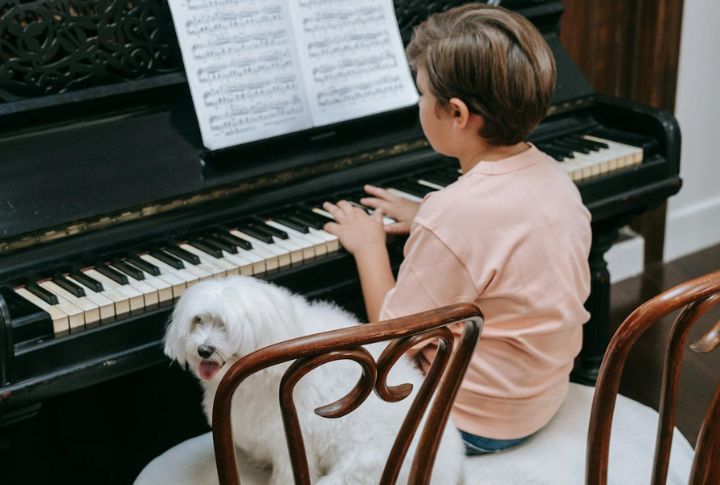15 Key Insights on How Music Influences Dog’s Behavior and Mood

The relationship between dogs and music has long fascinated researchers and pet owners. While humans have personal favorite songs, you might wonder how your dog perceives music. Do dogs have musical preferences, and how do different genres affect their behavior? Let’s investigate how dogs react to music and whether they have favorite tunes.
Response to Different Music Genres

Thanks to their extraordinary hearing, dogs can detect sounds beyond the human ear’s range. Research shows that they can recognize melodies and react to different types of music. The difference in how dogs respond to classical music versus heavy metal is especially notable.
The Science Behind Their Reactions

Dogs with exposure to classical music have been observed to rest more and bark less than when they listen to heavy metal, which often increases barking and signs of stress. This contrast in reaction suggests that dogs can respond to music’s characteristics, including pitch, tempo, and rhythm.
Recognizing Patterns and Tones

High-pitched sounds, for example, may trigger howling, a behavior inherited from their wolf ancestors. Interestingly, dogs also tend to respond positively to music that mimics human voice tones or has a rhythm that matches their heart rate. This also shows that familiar sounds can influence their reactions.
Emotional Connections with Music

Canines are highly sensitive to the emotional states of their owners, which can influence their reactions to music. They may respond positively to songs that make their owners happy. Conversely, loud or aggressive music might stress them due to their sensitivity to high sound levels.
Dog’s Positive Reactions to Music

It’s easy to tell your dog’s perception of your playlist. When dogs enjoy music, they may relax, lie down, wag their tails, or close their eyes. If agitated, they might bark, whine, or try to leave the room. These behaviors help identify whether a dog likes or dislikes specific genres of music.
Music’s Influence on Canine Emotions

Music can influence a dog’s emotional state. Calming genres like classical or soft instrumental tunes have been shown to reduce anxiety, especially in stressful situations like shelters or thunderstorms. This calming effect highlights music’s potential as a helpful tool for managing a dog’s emotional well-being.
Connection to Music Genres

This all comes down to the owner’s emotions and the dog’s sensory perceptions. If the owner enjoys a certain genre, the dog may associate it with positive feelings. On the other hand, everyone prefers things that calm them down, so it’s unsurprising that most dogs prefer soft, vibey songs.
Role of Tempo and Rhythm

A dog’s heart rate can directly affect the kind of music they enjoy. Music with tempos aligning with their natural heart rate (60-140 beats per minute) promotes relaxation. Faster tempos, especially with high-pitched sounds, may overstimulate dogs, leading to adverse reactions.
Howling in Response to Music

It’s common for dogs to start howling, especially when they hear songs with high-pitched notes. This behavior is often linked to their ancestral instincts, as wolves use howling to communicate. Your dog’s howling may be a sign of recognition or an attempt to “join in” with the melody.
Music in Animal Shelters

Animal shelters have experimented with playing music to help reduce stress in their canine residents. Aside from classical music, reggae has been an excellent alternative to these creatures. It turns out that some good old Bach or Bob Marley can make everything alright.
Creating Positive Associations with Music

Consider associating specific tunes with enjoyable activities to help your dog connect positively with music. Play soothing music during playtime, mealtime, or while giving your dog treats. Over time, your dog may associate these melodies with feelings of comfort, relaxation, and happiness.
Music Therapy for Dogs

Music therapy is becoming increasingly popular for dogs, especially those dealing with anxiety or hyperactivity. Specially composed tracks, using frequencies and rhythms suited to their sensory needs, have proven helpful during stressful situations like car rides, vet visits, or separation anxiety.
Response to Human Lyrics

While dogs cannot comprehend lyrics like humans do, they can react to the sound of a person’s voice. Hearing a human voice in songs has shown positive reactions to most canines. That being said, the pitch and tempo play a significant role, as high-energy sounds can be too much for a dog.
Perfect Soundtrack for Your Dog

Observing your dog’s behavior and understanding their musical preferences can help you create a personalized musical environment that supports their well-being. The right music, be it soothing classical melodies or relaxing reggae, can positively impact your dog’s mood and behavior.
Dog’s Musical Preferences

Although dogs don’t actively “choose” songs, their responses to music are certainly unique. Their reactions are influenced by pitch, tempo, and emotional connection with their owners. So take the time to bump some tunes with your furry buddy and see how things work out.





